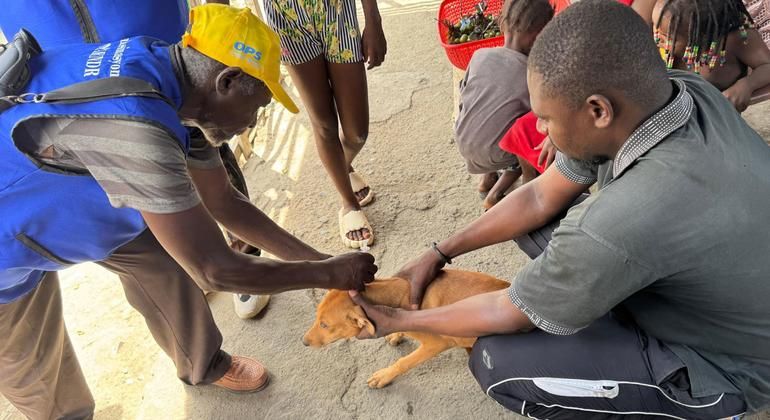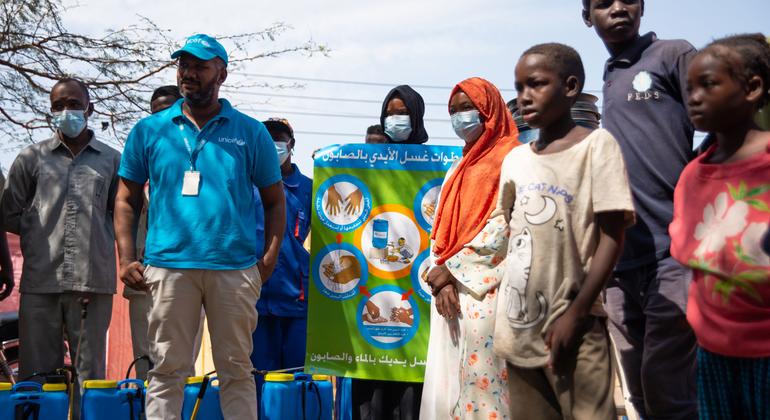Last July, in the remote town of Butête, in southern Haiti, Jonas*, nine years old, lost his life with rage.
When a street dog bit the boy on his leg, the wound seemed less. Like many families who live far from any health center, their mother did not know that immediate attention was critical.
In a week, the boy began to feel weak and refused to eat. When he arrived at the nearest hospital, he had begun to show the unmistakable symptoms of the rabies virus, including muscle spasms and unbearable hydrophobia, the fear of water.
A health worker from Paho prepares a vaccination of rage.
Not long after, Jonas died surrounded by his family.
He is the most recent victim of this deadly, but totally preventable disease, which has already charged four lives this year in the Nation of the Caribbean island, which deals with a multitude of crisis, including political, economic and political instability, as well as acute poverty and the lack of access to health services.
The data collected between 2022 and 2024 in Haiti show that the rabies virus continues to represent a serious threat to public health where more than 8,000 suspicious cases were investigated in dogs.
Of these, more than 1,100 cases were considered probable and 46 were confirmed in a laboratory.
During the same period, there were 24 suspects of human cases probably caused by a dog bite, with eight confirmed deaths.
Surveillance, research and response
As soon as Jonas was admitted to the hospital, the National Surveillance Network of the Ministry of Public Health was alerted.
Supported by the Pan American Health Organization (PAHO), a part of the World Health Organization (WHO), this National Personnel Network and Field Resources, including local epidemiology assistants and health workers of 'Motorcycles' who visit communities in motorcycles, quickly launched into action.

A health worker from 'Labo Moto' travels by motorcycle to visit a patient.
A response team was deployed in Butête to confirm that no one else in the community had been exposed to rage.
The child's family was closely monitored and received after the exhibition. The team also inspected the area where the dog and its puppies had died.
The investigation recommended organizing a dog vaccination campaign, strengthening surveillance and improving access to human rabies vaccines for the posterior treatment.
A response team was deployed in Butête to confirm that no one else in the community had been exposed to rage.
The child's family was closely monitored and received after the exhibition. The team also inspected the area where the dog and its puppies had died.
The investigation recommended organizing a dog vaccination campaign, strengthening surveillance and improving access to human rabies vaccines for the posterior treatment.

A dog is vaccinated against rabies in Haiti.
Lethal, but totally preventable
To stop the spread of rabies in Haiti, a canine vaccination campaign was launched in August with the aim of vaccinating around 140,000 dogs, including street and community animals, while the public awareness of prevention increased.
Before this, training was provided to four departmental coordinators, seventeen communal coordinators and more than 480 veterinary auxiliary agents, which later deployed in 240 teams in priority areas in the four departments of Artibonite, Center, Nord-Eest and Nord-Ouest.
A key innovation was the use of a mobile application to register vaccinated dogs, allowing real -time data collection, coverage monitoring and the best quality of data.
“When vaccinating large -scale dogs, we directly protect human communities, especially children. It is a simple but vital action that saves lives,” said Dr. Oscar Barreneche, the representative of Paho/WHO in Haiti. “Rabies is lethal, but 100 percent preventable.”
Building long -term resistance
It is expected that the achievement of an estimated vaccination coverage of 80 percent among the population of dogs target significantly reduces the circulation of the rabies virus in dogs.
The campaign also aims to increase awareness of rabies prevention and promote appropriate responses to the bites of alleged rabid animals.
“Despite the challenges and limitations raised by the security situation and general instability in the country, we consider that this vaccination campaign is a significant success,” said Dr. Haïm Joseph Corvil, coordinator of the Protection Unit in the Ministry of Agriculture, Natural Resources and Rural Development of Haiti.
Global Health Challenge
Rabies remains one of the most fatal zoonotic diseases in the world: infections that can be transmitted from animals to humans.
Worldwide, it causes approximately 59,000 deaths per year, 40 percent of which are children.
In all Americas, a 98 percent reduction has been achieved in cases of human rabies transmitted by dogs, which decreased from 300 cases in 1983 to only 10 cases reported during the past year, according to Paho.
* The name has changed to protect the identity of the person.












